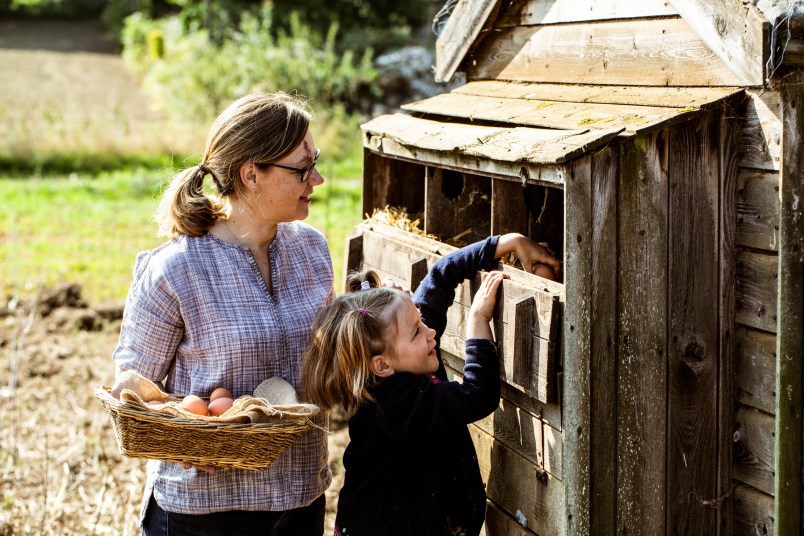So You Want to Start Raising Chickens? Here’s Everything You Need to Know
There are a lot of misconceptions out there!

Lisa Steele hasn’t purchased eggs from a store in more than 11 years.
She lives in rural Maine where she’s an author, master gardener, and 5th generation chicken keeper. She has written several books about raising chickens and has great information on her website Fresh Eggs Daily.
With the overall impact of quarantine and eggs in short supply around the country, many people are looking at the option of raising their own chickens. Not only is it appealing to be able to get food from your own backyard, but studies show farm fresh eggs are also healthier overall. While Steele is happy to see this surge of interest in one of her favorite hobbies, she also wants to make sure people have good information to start.
“It’s important to do your research and know what you’re getting into,” she says. “Don’t go into raising chickens based on the information you find on an Instagram post or in a Facebook group. These are great places for connecting with others, but there can be a lot of conflicting information.”
To help set the record straight about raising chickens and to get others started on the right foot, Steele helped debunk some of the most common myths and misconceptions. If you’re thinking of taking on this hobby, you’ll want to take a look.
Myth 1: You need a rooster to have eggs.
Steele says this is probably the biggest misconception when it comes to getting started with chickens. While there’s nothing wrong with having a rooster in your flock, you don’t actually need one for chickens to produce eggs. (You do need one if you want those eggs to be fertilized in the hopes of hatching baby chicks, though.) If you’re just starting out, Steele recommends 5-6 chickens for a family of four as well as a good chicken coop.
Myth 2: You’ll get eggs right away.
If you’re starting with baby chickens, Steele says you should expect to put some time in up front with them before you let them loose outside or in the coop. “Baby chicks need to live in your house for about two months before they go outside,” she says. “Then they won’t start laying eggs for another five months or more.”
Myth 3: Chickens lay eggs every day.
It’s great when you have chickens laying eggs regularly and even daily, but this isn’t always the case. “Chicken can be sort of temperamental,” Steele says. “They don’t lay if it’s too hot. They don’t lay if it’s too cold. There are a lot of other factors that come into play.” She also reminds people that chickens often stop laying eggs after a few years, yet then can live up to 10 years. So having chickens is a commitment that you shouldn’t take lightly.
Myth 4: You can let chickens wander at will.
“You can’t just let your chickens wander around when you go to work,” Steele says. “So many people underestimate the predators that chickens have like coyotes, foxes, hawks, and more. People can be shocked and horrified when their chickens are killed by their neighbor’s dog or even their own dogs.” Even if you don’t think you have predators in your area, you probably do, Steele says. This is why it’s important to get a proper coop and have a plan in place before you order those chicks. Yes, chickens can wander and explore, but you still need to supervise.
Myth 5: Chickens basically take care of themselves.
This one is a little tricky because chickens are pretty self-sufficient. However, they do still need daily care. Steele says feeding, watering, and general maintenance should just be part of a regular chore routine. All in all, she says it’ll be around 20-30 minutes a day — so not a big commitment— but it is a daily one.
Myth 6: All chickens are pretty much the same.
The opportunities seem endless when it comes to chicken breeds. There are so many different types to choose from. “I tell people these are not your grandmother’s chickens,” Steele says. “Do some research to find out what’s out there. If you can only have five chickens, get five different breeds. You’ll have a flock that looks different and lays all different colors of eggs. It makes it more interesting and fun.” If you live in a really hot or cold area, you might look for chickens that are best suited to that. If you want chickens that are big egg producers, keep that in mind, too.
Myth 7: Seek out quality information.
For those just getting started, Steele recommends really focusing on good sources of information. She tells people that .edu sites are a good place to start. And if you do find articles or information online, make sure it’s coming from someone who has experience in raising chickens. If you’re looking to order chicks for the first time, Steele recommends looking for a quality hatchery website or catalog that has lots of information about their different breeds. Yes, you might pay more than buying chicks or eggs on Craigslist, but you’ll be getting better quality information and support overall.
Above all, Steele says raising chickens should be fun. “I give my chickens treats, but some people would never do that,” she says. “Don’t take it too seriously. We’re supposed to be enjoying this. If it makes you happy to put twinkle lights in your coop, then do it. It’s a great reason to get outside.”













